World Youth U-16 Olympiad: India bags silver after an action-packed final round
Team India was off to a wonderful start winning all of their first three games at the World Youth (Under-16) Championship in Konya, Turkey but their dream run was slowed down by losses in the fourth and the sixth rounds. Regardless, the team did not lose its morale. Round 7 onwards, they stacked up three back to back wins against high profile opponents like Russia, Azerbaijan and Iran to finish second on the podium. On board 1, Arjun Erigaisi won an individual silver thanks to his unbeaten 7.0/9. Sankalp Gupta was another Indian to take home a medal. Scoring 5 points out of his eight games, Sankalp finished with a rating performance of 2440 to clinch the bronze medal on board three.
Team India shines in Turkey
The World Youth Under-16 Championship came to a close on Sunday evening in Konya, Turkey with Uzbekistan taking the title prize. The Indian team finished second after scoring back to back wins in the final three rounds while China bagged the third spot. The event had attracted forty-six teams from 39 countries that included four Grandmasters and fifteen International Masters.
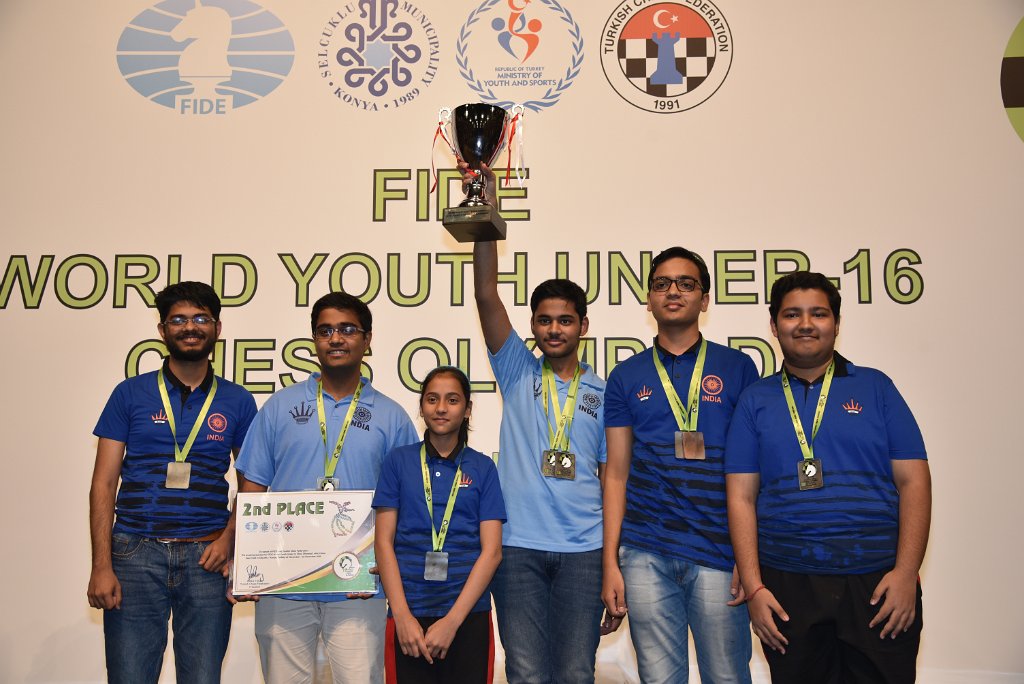
Seeded third, the Indian team comprised of GM Arjun Erigaisi, IM P Iniyan, Sankalp Gupta, Koustav Chatterjee and WIM Divya Deshmukh. Erigaisi, the only Grandmaster in the team, was clearly the ‘MVP’ of the squad. Scoring an undefeated 7/9 with five wins and four draws, he bagged an individual silver for his performance on board one. Sankalp Gupta, who played on board three, also took home a bronze medal for his 5/8 performance.
Although India was one of the favourites in the tournament, the road to the top wasn’t quite as easy. After revving up with three straight victories in the beginning, the team suffered its first setback by losing to the much lower-ranked Belarusian team in the fourth round. While quick draws were seen on the top three boards (where the Indian players were higher rated), the Belarusian team struck on board four as Divya Deshmukh lost with white against Maksim Tsaruk in a complicated 2.Bg5 Dutch.
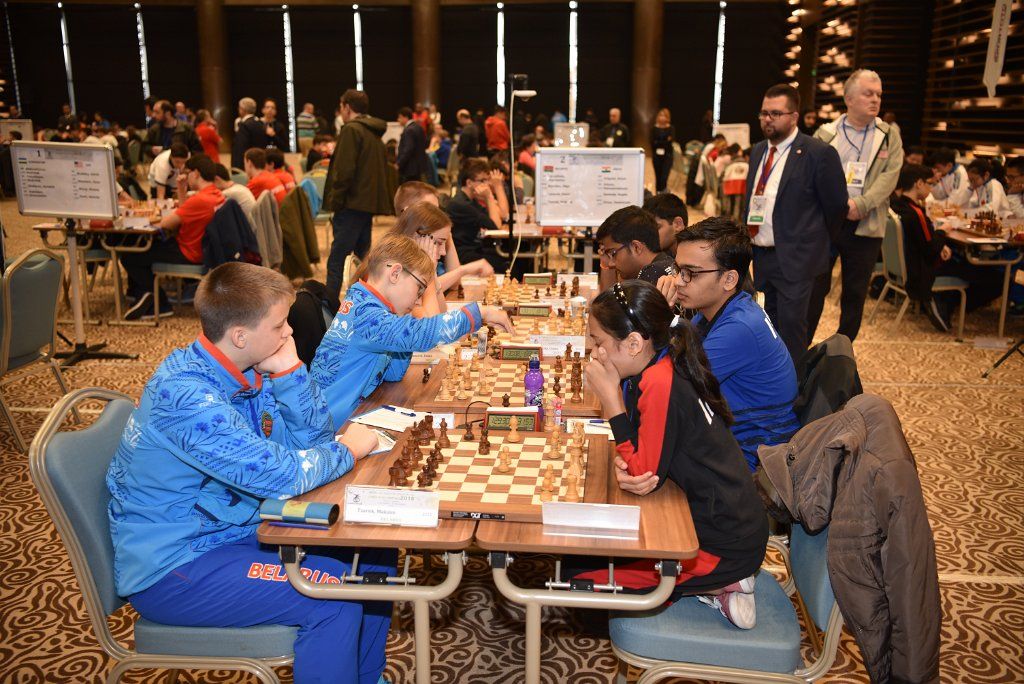
Two rounds later, the team suffered a second loss at the hands of the top seeded Uzbekistan. But this time, it wasn’t a close call with three draws and a loss. The Uzbeks won with a commanding 3-1 margin. The only silver lining was Arjun Erigaisi’s win over Nodirbek Abdusattorov on the top board.
Abdusattorov, as black, went for the solid lines of the Berlin Defence in response to Erigaisi’s 1.e4. As is routine in the Berlin, an equal position was reached out of the opening and a mass exchange of pieces followed. At the end of the sequence, however, Erigaisi had a slight pull on the position because of the passivity of black’s dark squared bishop.
A crucial moment came on the 26th move when the Uzbek grandmaster made an inaccuracy that eventually cost him his bishop. Abdusattorov tried hard to remain in the game by exchanging as many pawns as possible but by the 51st move, Erigaisi had clarified the situation and forced resignation.
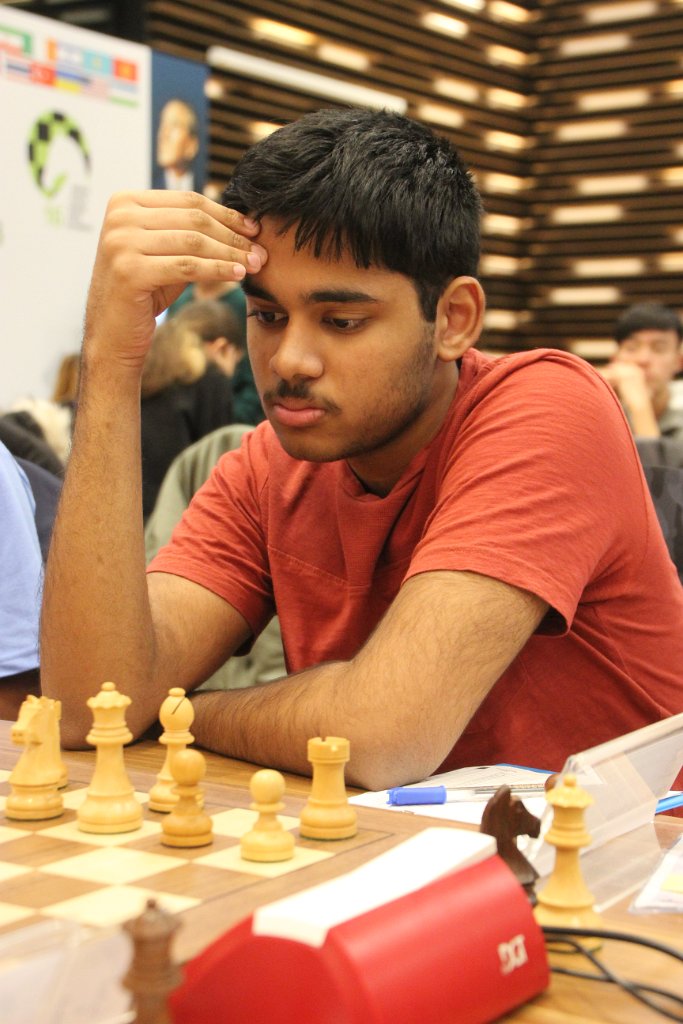
On board two, Iniyan was thoroughly outprepared by Nodirbek Yakubboev. In a 3.g3 King’s Indian, Iniyan was caught off guard by an opening novelty by the Uzbek International Master and ended up shedding a piece very early in the game. The position, almost immediately liquidated into an endgame after this. Iniyan had two pawns as compensation but after 55 moves of play, Yakubboev managed to prove the superiority of his extra piece.
Javokir Sindarov, the 12-year-old Uzbek sensation, stormed Sankalp Gupta’s King in a Ruy Lopez Steinitz on the third board while Koustav Chatterjee lost with black in a French Defence game after making some errors in the endgame on the fourth.
Despite their humbling loss in the sixth round, the Indians came back strongly beating some very strong teams in the final three rounds. In round seven, India scored a commanding 3-1 win over the second-seeded Russian team and then again in the penultimate round, they won against Azerbaijan, the fourth seeds of the tournament.
In the final round, India was pitted against Iran. Being the fifth-ranked team by rating average, the Iranians were no pushover. On the top board, Arjun Erigaisi was to take on Alireza Firouzja. Some months ago, GM Ivan Sokolov had dubbed Firouzja to be the next Anand and the lad was proving the truth in his tutor’s words. By this point in the tournament, Firouzja had scored 7.5 points out of a possible 8 and was in top form.
Erigaisi, on the other hand, was also having a good event. He hadn’t lost a single game thus far and had a decent 6.5/8 by the penultimate round. In the game, however, none of the players seemed to be in the mood for a full-blooded battle. A Gruenfeld Defence was essayed by Firouzja and after just 16 moves of play, a draw was agreed.
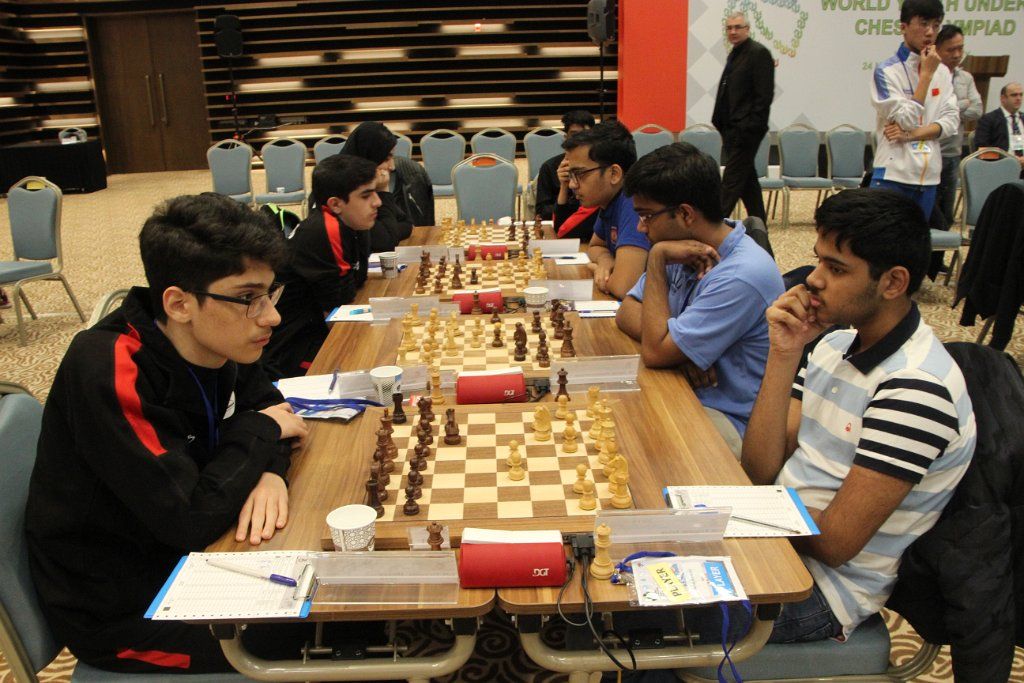
The games on boards two and three also did not produce any decisive results either. Iniyan drew against Amirreza while Sankalp Gupta held Gholami Orimi Mehdi. India was tied at the third place with Iran after the penultimate round and since Iran had a better tiebreak score, a draw could have meant losing out on a podium finish.
On the fourth board, Divya Deshmukh had the white pieces against Mohtare Asadi. As black, Divya had played the Scheveningen Sicilian and had reached a better position out of the opening. In the middle game, the Indian fourth boarder sacrificed a couple of pawns to get an attack going on the kingside. While this looked dangerous, the computers gave her opponent an edge after this. Divya went on with her attack, nevertheless, and managed to induce mistakes from her opponent. On her 34th turn, Asadi made a grave error that gave Divya a mating attack and by the 40th move, Divya had brought home the bacon.
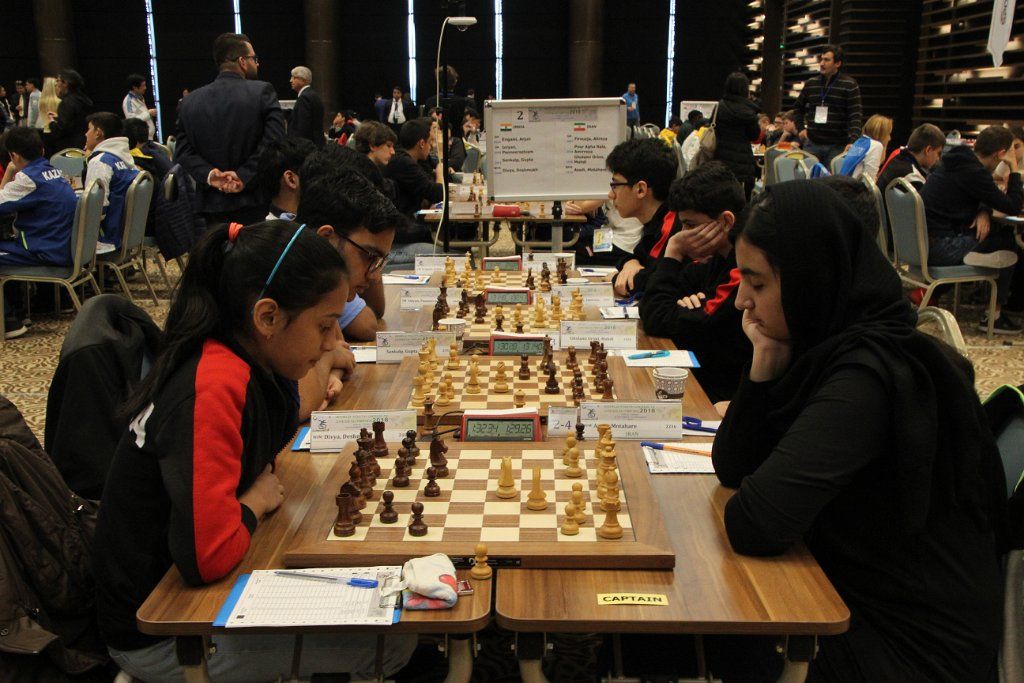
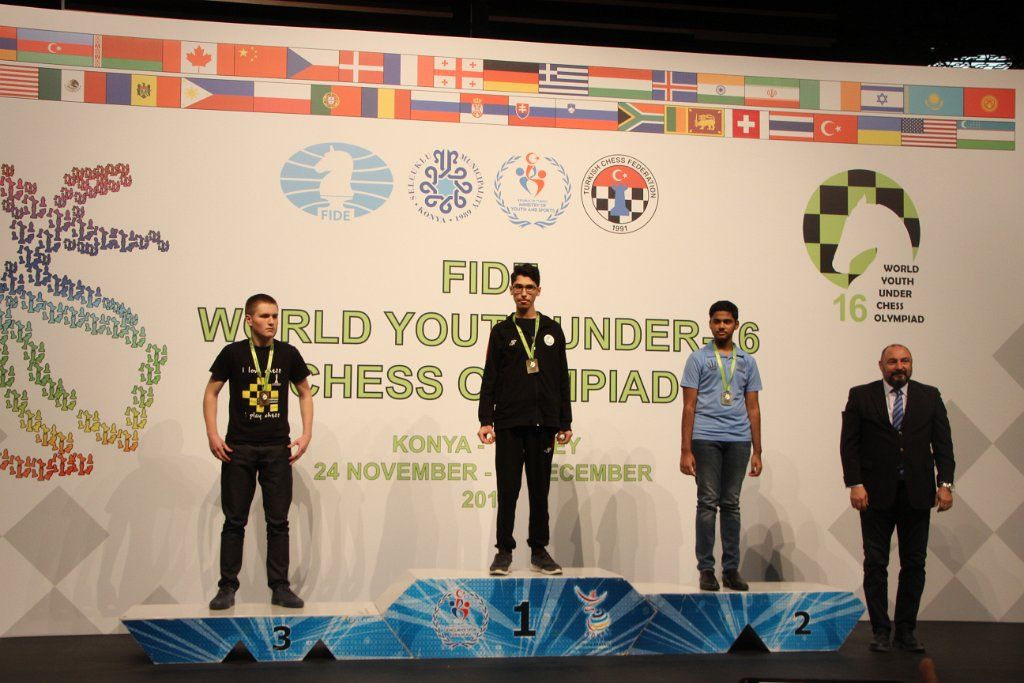
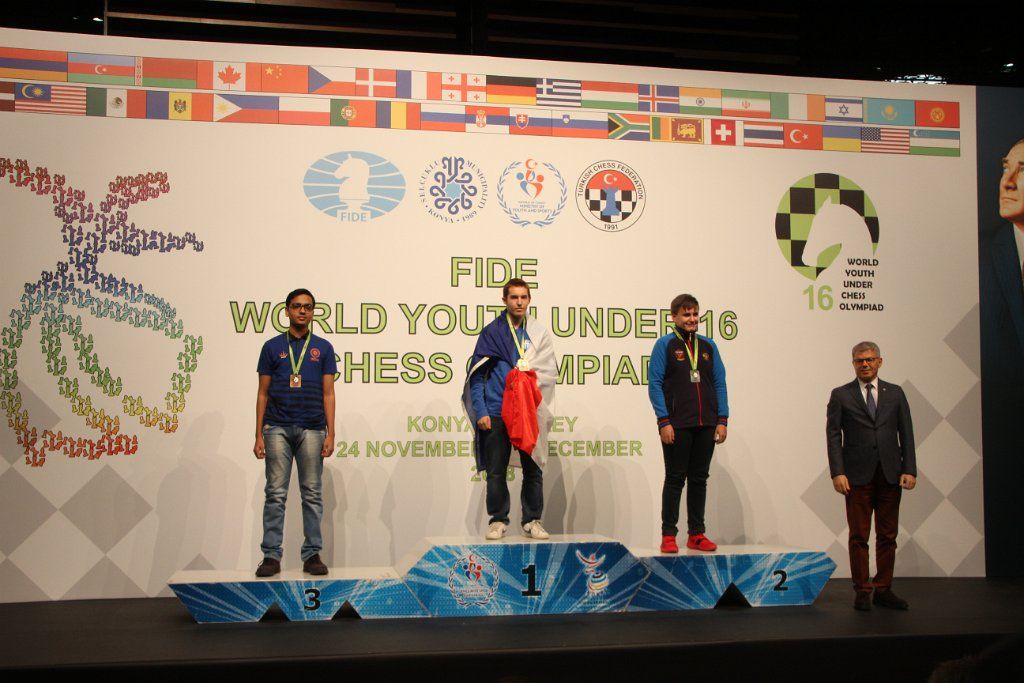
This is India’s second straight silver at the World Youth (U-16). Last year, the team had finished behind Russia, having scored seven wins, one draw and a loss. An important difference this time, however, was that the team was missing two of its biggest stars, R Praggnanandhaa and Nihal Sarin.
All Games
Final Standings (Top 10)
| Rk. | SNo | FED | Team | Games | + | = | - | TB1 | TB2 | TB3 | TB4 | |
| 1 | 1 | UZB | UZBEKISTAN | 9 | 8 | 0 | 1 | 16 | 264,0 | 26,5 | 91 | |
| 2 | 3 | IND | INDIA | 9 | 7 | 0 | 2 | 14 | 230,0 | 22,0 | 98 | |
| 3 | 25 | CHN | CHINA | 9 | 6 | 1 | 2 | 13 | 228,0 | 23,0 | 94 | |
| 4 | 13 | BLR | BELARUS | 9 | 6 | 1 | 2 | 13 | 213,0 | 21,5 | 92 | |
| 5 | 5 | IRI | IRAN | 9 | 6 | 0 | 3 | 12 | 242,0 | 25,0 | 95 | |
| 6 | 6 | ARM | ARMENIA | 9 | 6 | 0 | 3 | 12 | 202,5 | 23,5 | 84 | |
| 7 | 9 | UKR | UKRAINE | 9 | 6 | 0 | 3 | 12 | 182,5 | 21,0 | 90 | |
| 8 | 4 | AZE | AZERBAIJAN | 9 | 6 | 0 | 3 | 12 | 175,5 | 21,0 | 83 | |
| 9 | 16 | KAZ | KAZAKHSTAN | 9 | 5 | 2 | 2 | 12 | 174,5 | 22,0 | 77 | |
| 10 | 8 | USA | USA | 9 | 5 | 1 | 3 | 11 | 169,0 | 19,0 | 90 |
Links

